Health Senior

How often should seniors engage in aerobic activities for heart health ?
Engaging in regular aerobic activities is crucial for seniors to maintain heart health and overall well-being. The American Heart Association recommends at least 150 minutes of moderate-intensity or 75 minutes of vigorous-intensity aerobic activity per week, spread throughout the week. For seniors, this could include brisk walking, swimming, or biking for at least 30 minutes five days a week (moderate intensity) or running and fast cycling for at least 25 minutes three days a week (vigorous intensity), depending on their capability and medical restrictions. Regular aerobic activity offers numerous benefits for seniors, including improved cardiovascular fitness, better blood pressure and cholesterol levels, weight management, increased muscular strength and endurance, and boosted mental health. However, safety precautions should be taken, such as consulting with a healthcare provider before starting an exercise program, starting slowly, choosing low-impact exercises, staying hydrated, wearing appropriate clothing and footwear, and monitoring bodily responses to the activity. By following these guidelines and taking necessary precautions, seniors can significantly improve their quality of life and maintain their independence longer.
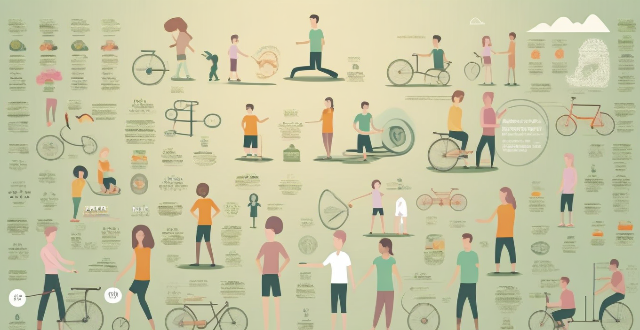
What role do sports clubs and community centers play in promoting public health initiatives ?
Sports clubs and community centers significantly contribute to public health efforts by offering programs and services that encourage physical activity, provide educational opportunities, build social support networks, target specific demographics, and collaborate with health organizations. These establishments play a crucial role in promoting healthier lifestyles through their facilities, workshops, group activities, youth and senior programs, and partnerships with hospitals and awareness campaigns. By catering to diverse age groups and interests, sports clubs and community centers help foster a culture of health and wellness within communities.
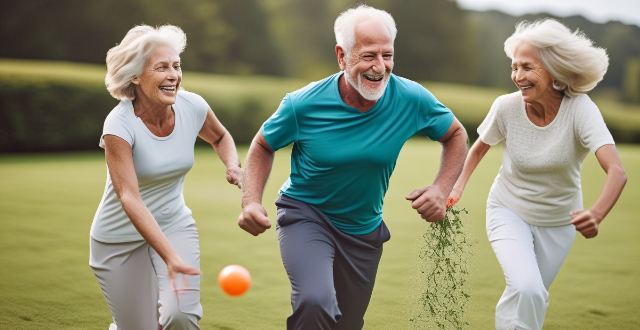
How does exercise benefit the health of older adults ?
Exercise plays a crucial role in maintaining the health and well-being of older adults. Regular physical activity can significantly improve their quality of life by preventing diseases, promoting longevity, and enhancing mental health. This text discusses the various benefits of exercise for seniors, including improvements in strength, endurance, mobility, balance, chronic disease management, stress reduction, emotional health, cognitive functioning, social interaction, independence, and overall quality of life. Engaging in regular physical activity is one of the most effective ways for seniors to maintain a healthy and fulfilling lifestyle as they age.

How does dancing contribute to both physical health and socialization in the elderly ?
Dancing provides elderly with physical health benefits such as improved cardiovascular function, muscular strength, balance, and weight management. It also promotes socialization by increasing interaction, offering a sense of community, providing cognitive stimulation, and boosting self-esteem.

What kind of food and nutrition should I provide for my pet to ensure its health ?
To ensure your pet's health, it is crucial to provide the right food and nutrition. Understanding your pet's species-specific dietary requirements, choosing high-quality pet food, supplementing with fresh foods, monitoring your pet's weight and health, and staying informed about pet nutrition research are key aspects to consider. Tailor your pet's diet to their individual needs for a long and healthy life.
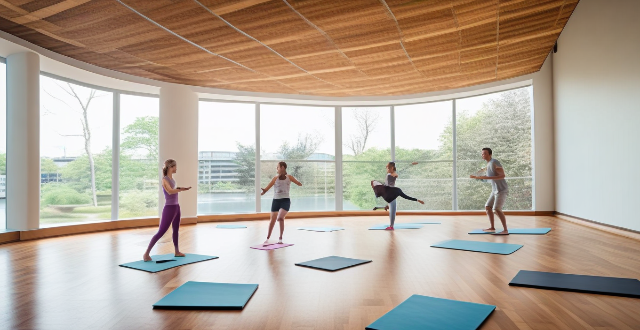
How can seniors with limited mobility engage in physical activities that promote social interaction ?
Engaging seniors with mobility issues in physical activities is crucial for their health and social well-being. Adaptive sports like water aerobics, seated yoga, and tai chi offer low-impact workouts with a community feel. Assistive devices such as walking aids and resistance bands support exercise, while community centers provide opportunities for group games and art activities. Home-based solutions include teleconferencing classes and pet therapy programs. By tailoring activities to individual needs, seniors can stay active and connected, promoting both physical health and social interaction.
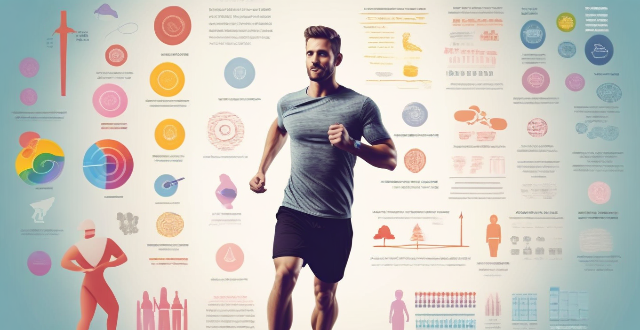
How does sports culture influence society's perception of health and fitness ?
Sports culture significantly influences societal perceptions of health and fitness by promoting physical activity, raising health awareness, fostering mental well-being, challenging stereotypes, and driving economic growth in the health and fitness industry. This multifaceted impact enhances individual lives and contributes to the overall well-being of communities and nations worldwide.

How does vaccine distribution affect public health ?
Vaccine distribution is crucial for global health, reducing disease incidence and healthcare costs while increasing productivity. Challenges include inequitable access, logistical complexities, and public perception issues.
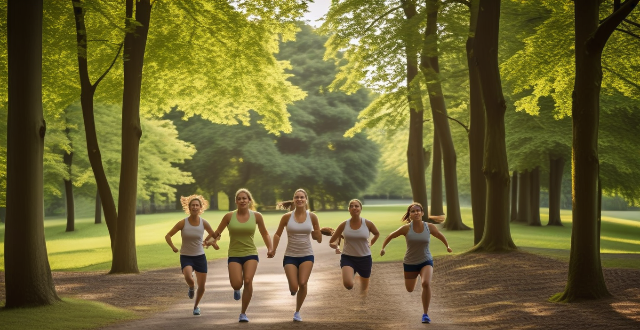
How does regular exercise impact the social well-being of seniors living alone ?
Regular exercise is crucial for enhancing the social well-being of seniors living alone, as it improves mood and mental health, increases social interaction, enhances cognitive function, and reduces the risk of chronic diseases. Engaging in regular exercise can help seniors maintain their independence and improve their overall quality of life.
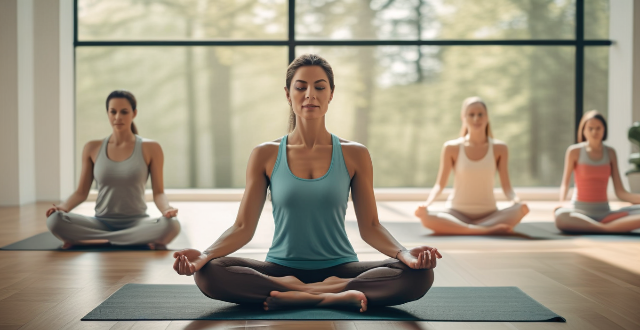
Are there any specific exercise programs designed for seniors that focus on building social connections ?
The article discusses the benefits of exercise programs for seniors that focus on building social connections. It highlights how regular exercise can improve physical health, mental health, and increase social connections in seniors. Examples of such programs include SilverSneakers, Tai Chi, walking groups, yoga, and water aerobics. The article emphasizes the importance of staying active and connected within communities as we age.

How does a balanced diet impact women's bone health ?
Balanced diet is crucial for women's bone health, including preventing osteoporosis. Key nutrients are calcium, vitamin D, protein, and phosphorus. Fruits and vegetables also support overall well-being.

What is the role of the World Health Organization (WHO) in promoting global health ?
The World Health Organization (WHO) plays a crucialThe World Health Organization (WHO) plays a crucial by providing leadership, setting norm WHO's work is focused on improving health outcomes worldwide through various activities such as convening stakeholders, establishing international standards for health, generating scientific knowledge to inform policy decisions, providing technical support to countries, and monitoring global health trends.

How can countries improve their preparedness for global health emergencies ?
Countries can improve their preparedness for global health emergencies by strengthening healthcare infrastructure, developing surveillance and early warning systems, enhancing international cooperation, improving public health education and awareness, and establishing contingency plans and policies.

How can caregivers encourage their elderly loved ones to participate in physical activities ?
This article emphasizes the importance of physical activities for elderly people, highlighting benefits such as improved mobility, cardiovascular health, mental health, sleep patterns, and slowed aging. It suggests strategies to encourage participation in physical activities, including starting with simple exercises, making activities enjoyable, setting achievable goals, incorporating social elements, providing proper equipment, offering support, seeking professional help, educating about benefits, maintaining consistency, and addressing concerns and fears. The conclusion stresses the need for patience, understanding, and a tailored approach to successfully incorporate physical activities into the daily routines of elderly loved ones, leading to improved health and overall well-being.

What are the long-term health consequences of climate change ?
The long-term health consequences of climate change are multifaceted and can be categorized into several key areas, including increased frequency and severity of heat waves, extreme weather events, spread of diseases, air quality issues, food insecurity, and mental health impacts. These effects have far-reaching implications for public health and require urgent action to mitigate their impact.

Why is vaccine equity important for global health ?
Vaccine equity is crucial for global health as it ensures fair distribution of life-saving vaccines worldwide. It helps prevent disease outbreaks, reduce health inequalities, promote economic stability, and improve overall health outcomes. By ensuring everyone has access to vaccines, we can create a healthier world for all.

How can seniors who are new to an area use local sports clubs as a way to meet people and build friendships ?
Moving to a new area can be challenging, especially for seniors leaving behind long-standing friendships. Joining local sports clubs is an excellent way to meet people and build new friendships. Here's a step-by-step guide on how seniors can use sports clubs for social connection: 1. **Research Available Clubs**: Start by finding out which sports clubs are available through online searches, local newspapers, community bulletin boards, or by asking neighbors. Look for sports that suit individual interests and physical abilities, such as golf, bowling, swimming, Tai Chi, walking clubs, or dance classes. 2. **Attend Open Days or Trial Sessions**: Many clubs offer open days or free trial sessions, allowing seniors to experience the club atmosphere, meet current members, and try out the sport without commitment. 3. **Join Regular Activities**: Once a suitable club and sport have been identified, becoming a regular member is crucial. This involves signing up for membership, attending scheduled activities consistently, and participating in club events and social gatherings. 4. **Engage Socially Within the Club**: To build friendships within the club, introduce yourself to other members, show interest in their experiences, invite them for coffee or meals after activities, and join or organize social events outside of sporting activities. 5. **Volunteer or Help with Club Activities**: Active involvement in the club's functioning can deepen connections. Offer to help with organizational tasks, volunteer for events, and share skills or expertise with the group, such as coaching or officiating. 6. **Stay Open and Positive**: A positive attitude is key in building new friendships. Be open to meeting people from diverse backgrounds, maintain a friendly demeanor, and embrace new experiences while enjoying the journey. By following these steps, seniors can use local sports clubs as a platform to engage in physical activities and forge new friendships, becoming an integral part of their new community.

How does sea level rise impact public health, especially in coastal areas ?
Sea level rise, driven by global warming and climate change, poses significant threats to public health in coastal areas through flooding and storm surge, waterborne diseases, environmental health hazards, mental health concerns, economic impacts, and social determinants of health. Addressing this challenge requires a multifaceted approach that includes adaptation strategies, improved infrastructure resilience, and mitigation efforts to reduce greenhouse gas emissions.

How important is hydration in maintaining women's health ?
Proper hydration is crucial for women's health, affecting body temperature regulation, joint lubrication, digestion and nutrient absorption, waste elimination, skin health, weight management, and support during pregnancy and breastfeeding. It is recommended that women drink at least eight glasses of water per day, with individual needs varying based on age, activity level, and climate.

How can a balanced diet contribute to women's health ?
A balanced diet is crucial for women's health, providing essential nutrients, supporting reproductive health, managing weight, preventing chronic diseases, enhancing mental well-being, promoting bone and digestive health, and improving skin and hair health. By incorporating a variety of food groups, women can ensure optimal physical and mental well-being across their lifespan.
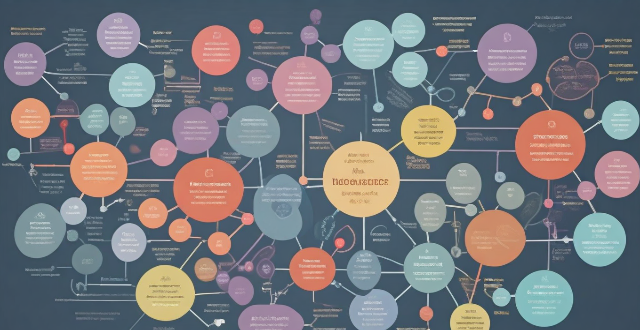
How does equitable vaccine distribution affect public health outcomes ?
Equitable vaccine distribution is crucial for global health security, herd immunity, reduced disease severity, economic stability, and social equity. It leads to decreased transmission rates, improved global health indicators, increased trust in health systems, and enhanced research. However, logistical hurdles, political will, and resource allocation are challenges that must be addressed.

How do climate losses and damages impact human health ?
This article discusses the impact of climate change on human health, highlighting various ways in which climate losses and damages can affect well-being. It covers topics such as extreme weather events causing physical injuries and illnesses, worsening air quality leading to respiratory problems, food insecurity resulting in malnutrition, increased waterborne diseases due to warmer water sources, and mental health issues arising from displacement and migration. The article emphasizes the need for a comprehensive approach to address these challenges, including mitigating greenhouse gas emissions, adapting to changing conditions, and providing support for vulnerable populations.
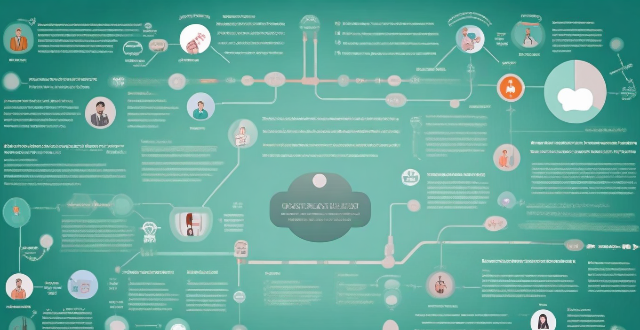
What is the importance of mental health in global health initiatives ?
This document discusses the importance of mental health in global health initiatives. It explains why mental health matters and how it affects physical health, economic stability, and social outcomes. The document also discusses how mental health affects global health initiatives and emphasizes the need for culturally sensitive approaches to address mental health issues sustainably.

In what ways does mental health support impact overall women's health ?
This text discusses the importance of mental health support for women's overall health, highlighting its impact on physical health, emotional well-being, relationships, and work performance. It emphasizes that good mental health can reduce the risk of chronic diseases, improve sleep quality, and help manage pain. Additionally, it mentions how mental health support can enhance emotional well-being by reducing stress, improving mood, and increasing resilience. The text also points out that mental health support can strengthen relationships through improved communication, better emotional regulation, and greater empathy. Lastly, it notes that mental health support can enhance work performance by improving focus, reducing absenteeism, and increasing job satisfaction.

What role does sleep play in maintaining personal health ?
The text discusses the importance of sleep in maintaining personal health, including its roles in physical restoration and repair, energy conservation, weight management, memory consolidation, emotional regulation, cognitive function, stress reduction, mood stabilization, and relationship health. Adequate sleep is crucial for overall well-being, and prioritizing it can support physical, mental, and emotional health.

How does stress affect women's mental health ?
This text discusses the effects of stress on women's mental health, including anxiety and depression, sleep disturbances, emotional eating, low self-esteem, difficulty concentrating, irritability and mood swings, substance abuse, and physical health issues. It emphasizes the importance of self-care practices to manage stress effectively.

What are the impacts of climate change on human health ?
Climate change affects human health in various ways, including increased heat-related illnesses, extreme weather events, changes in disease patterns, food and water security issues, and mental health impacts. It is important to take action to mitigate these effects and protect public health.

How does menstrual cycle affect women's mental health ?
The menstrual cycle can affect women's mental health by causing mood swings, low self-esteem, changes in appetite, fatigue, and psychological symptoms. To manage these changes, it is important to stay hydrated, get enough sleep, exercise regularly, practice mindfulness and relaxation techniques, and seek support from healthcare providers and loved ones.

How can educational psychology aid in addressing students' mental health issues ?
Educational psychology can aid in addressing students' mental health issues by understanding the role of emotional intelligence, promoting a positive school climate, providing early intervention and support services, encouraging self-care and resilience, and facilitating collaboration between educators and mental health professionals.